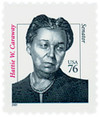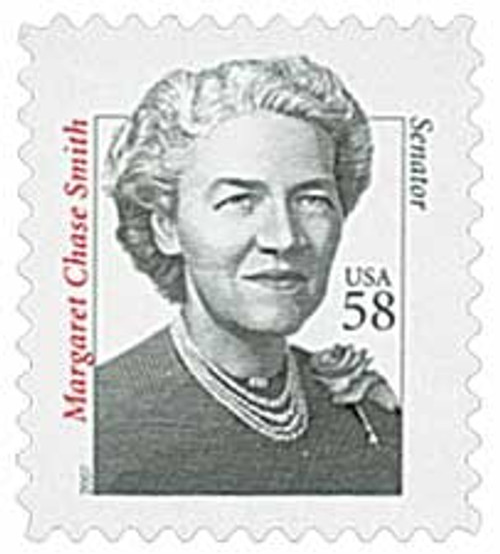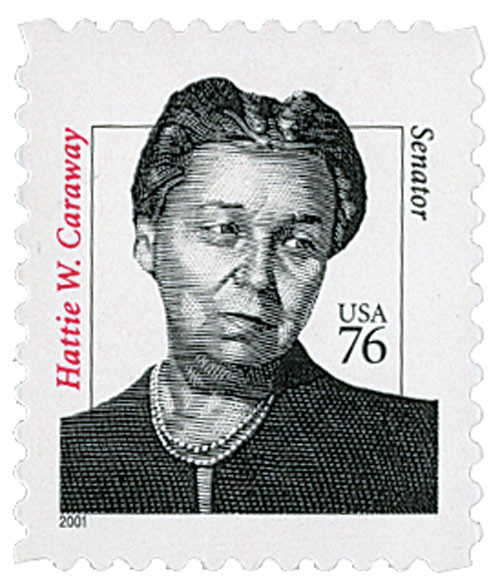
# 3431 - 2001 76c Hattie Caraway, Die cut 11
76¢ Hattie Caraway
Distinguished Americans Series
City: Little Rock, AR
Printed by: Banknote Corporation of America
Printing Method: Lithographed and engraved
Perforations: 11
Color: Red and black
First Woman Elected To The U.S. Senate
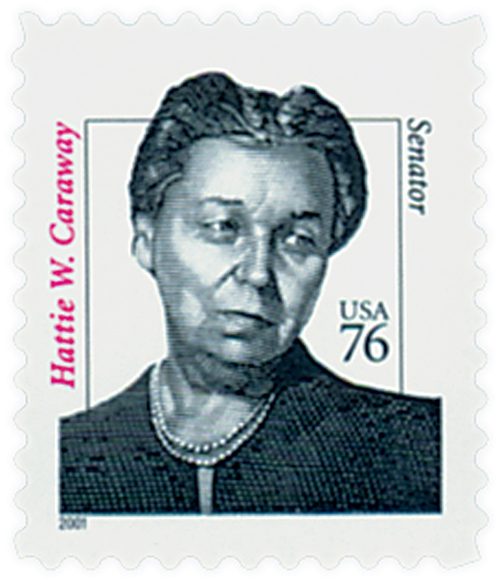
On January 12, 1932, Hattie Caraway became the first women elected to serve in the United States Senate.
Born in Bakerville, Tennessee, on February 1, 1878, Hattie Wyatt earned a Bachelor of Arts degree from Dickson (Tennessee) Normal College in 1896. She taught school for a few years before marrying Thaddeus Caraway in 1902.
After they were married, the Caraways moved to Jonesboro, Arkansas, where Thaddeus opened a legal practice and Hattie raised their three children and oversaw their cotton farm. Thaddeus entered politics in 1912, serving in the House of Representatives. He was then made a US Senator in 1921.
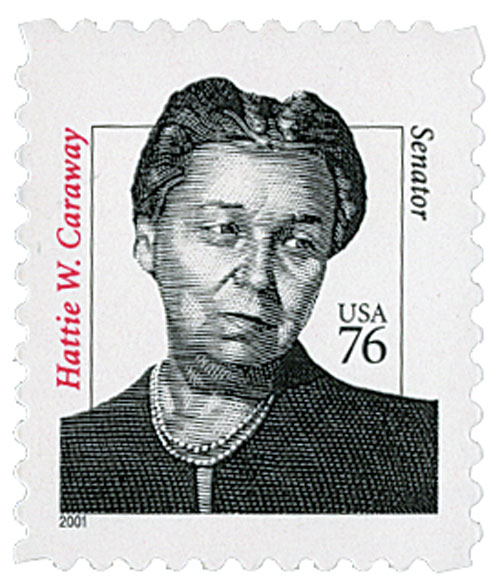
Thaddeus died unexpectedly on November 6, 1931. At that time, it wasn’t unusual for widows to temporarily fill their husband’s seats. So Hattie was sworn in as a temporary US Senator on December 9, 1931. A month later, the Senate held a special election on January 12, 1932. In that election, Hattie claimed victory with 92 percent of the vote over the other two independent candidates. Hattie’s victory then inspired the creation of the Arkansas Women’s Democratic Club, which helped raise money for her next campaign and encouraged women to vote.
Most people had expected that Hattie would hold her husband’s seat for the remainder of his term, but not run for re-election. So on the filing deadline in May, she shocked many in Arkansas when she announced she would run to keep her seat. Hattie proclaimed, “The time has passed when a woman should be placed in a position and kept there only while someone else is being groomed for the job.”
76¢ Hattie Caraway
Distinguished Americans Series
City: Little Rock, AR
Printed by: Banknote Corporation of America
Printing Method: Lithographed and engraved
Perforations: 11
Color: Red and black
First Woman Elected To The U.S. Senate

On January 12, 1932, Hattie Caraway became the first women elected to serve in the United States Senate.
Born in Bakerville, Tennessee, on February 1, 1878, Hattie Wyatt earned a Bachelor of Arts degree from Dickson (Tennessee) Normal College in 1896. She taught school for a few years before marrying Thaddeus Caraway in 1902.
After they were married, the Caraways moved to Jonesboro, Arkansas, where Thaddeus opened a legal practice and Hattie raised their three children and oversaw their cotton farm. Thaddeus entered politics in 1912, serving in the House of Representatives. He was then made a US Senator in 1921.

Thaddeus died unexpectedly on November 6, 1931. At that time, it wasn’t unusual for widows to temporarily fill their husband’s seats. So Hattie was sworn in as a temporary US Senator on December 9, 1931. A month later, the Senate held a special election on January 12, 1932. In that election, Hattie claimed victory with 92 percent of the vote over the other two independent candidates. Hattie’s victory then inspired the creation of the Arkansas Women’s Democratic Club, which helped raise money for her next campaign and encouraged women to vote.
Most people had expected that Hattie would hold her husband’s seat for the remainder of his term, but not run for re-election. So on the filing deadline in May, she shocked many in Arkansas when she announced she would run to keep her seat. Hattie proclaimed, “The time has passed when a woman should be placed in a position and kept there only while someone else is being groomed for the job.”









